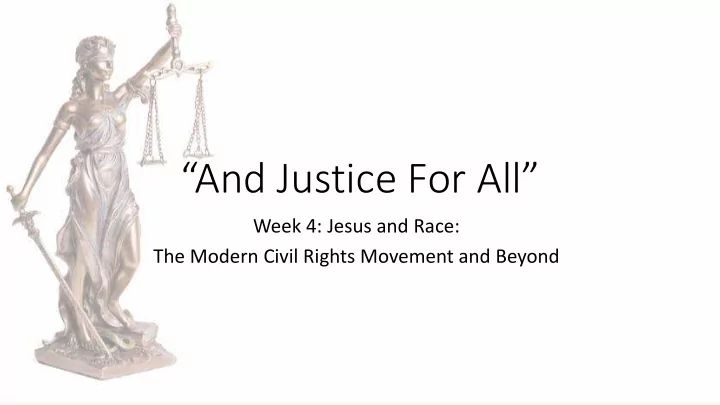

“And Justice For All” Week 4: Jesus and Race: The Modern Civil Rights Movement and Beyond
Welcome! • Please: • Make a name tag for yourself. • Help yourself to beverages and refreshments. • Fill out the information card on the table. • Read any materials on the table while you wait for the class to begin.
Pete Enns and Ja Jared Byas Recent Podcast Episode 61: Creeds, Confessions, & Statements of Belief. Discusses the recent Statement on Social Justice & the Gospel . Hagar Sisters: info@hagarsisters.org
Opening Discussion What might one conclude about race and/or segregation from the scripture passages?
Jesus’ Words (NRSV, 1989, Used with Permission, Bible Gateway) Matthew 23:12: All who exalt themselves will be humbled, and all who humble themselves will be exalted. Mark 8:34-37: If any want to become my followers, let them deny themselves and take up their cross and follow me. For those who want to save their life will lose it, and those who lose their life for my sake, and for the sake of the gospel, will save it. For what will it profit them to gain the whole world and forfeit their life? Matthew 22:37-40: Indeed, what can they give in return for their life? You shall love the Lord your God with all your heart, and with all your soul, and with all your mind.’ This is the greatest and first commandment. And a second is like it: ‘You shall love your neighbor as yourself.’ On these two commandments hang all the law and the prophets.
Jonathan Walton on a “Lens of Love” When I read the Bible, whether it’s the Exodus narrative, the Hebrew prophets, or the Gospels, I see a God who cares about the least and the left behind. God sees those whom society typically ignores. A lens of love, then, is an approach that asks us to read biblical narratives with these same eyes of grace and compassion for the most vulnerable in any given story. This is why it’s important to have a sociohistorical understanding of power relations in the ancient world.
Urbana 1970: Tom Skinner To a great extent, the evangelical church in America supported the status quo. It supported slavery; it supported segregation; it preached against any attempt of the black man to stand on his own two feet. And where there were those who sought to communicate the gospel to black people, it was always done in a way to make sure that they stayed cool. "We will preach the gospel to those folks so they won't riot; we will preach the gospel to them so that we can keep the lid on the garbage pail."
Urbana 1970: Tom Skinner Understand that for those of us who live in the black community, it was not the evangelical who came and taught us our worth and dignity as black men. It was not the Bible- believing fundamentalist who stood up and told us that black was beautiful. It was not the evangelical who preached to us that we should stand on our two feet and be men, be proud that black was beautiful and that God could work his life out through our redeemed blackness. Rather, it took Malcolm X, Stokely Carmichael, Rap Brown and the Brothers to declare to us our dignity. God will not be without a witness.
Urbana 1970: Tom Skinner There is no possible way you can talk about preaching the gospel if you do not want to deal with the issues that bind people. If your gospel is an "either-or" gospel, I must reject it. Any gospel that does not talk about delivering to man a personal savior who will free him from the personal bondage of sin and grant him eternal life and does not at the same time speak to the issue of enslavement, does not speak to the issue of injustice, does not speak to the issue of inequality - any gospel that does not want to go where people are hungry and poverty-stricken and set them free in the name of Jesus Christ is not the gospel.
Confessions of a(n)… • Urban-raised, • Military-drilled, • Liberal arts educated, • Asian-cultured, • Woman.
Thinking Outside Our Boxes What do you notice about perspective in each of the primary source documents you read?
Tale of Two Friends
Generational Perspectives • Steve Schaffner, Computational Biologist • Megan Lietz, Emmanuel Gospel Center
Billy Graham, , A World Afl flame , 1965 “In Christ the middle wall of partition has been broken down. There is no Jew, no Gentile — no black, white, yellow, or red. We could be one great brotherhood in Jesus Christ. However, until we come to recognize Him as the Prince of Peace and receive His love in our hearts, the racial tensions will increase, racial demands will become more militant, and a great deal of blood will be shed. The race problem could become another flame out of control!”
December 24, 1967 Now let me suggest first that if we are to have peace on earth, our loyalties must become ecumenical rather than sectional. Our loyalties must transcend our race, our tribe, our class, and our nation; and this means we must develop a world perspective.
No individual can live alone; no nation can live alone, and as long as we try, the more we are going to have war in this world. Now the judgment of God is upon us, and we must either learn to live together as brothers or we are all going to perish together as fools. It really boils down to this: that all life is interrelated. We are all caught in an inescapable network of mutuality, tied into a single garment of destiny. Whatever affects one directly, affects all indirectly. We are made to live together because of the interrelated structure of reality.
Recommend
More recommend